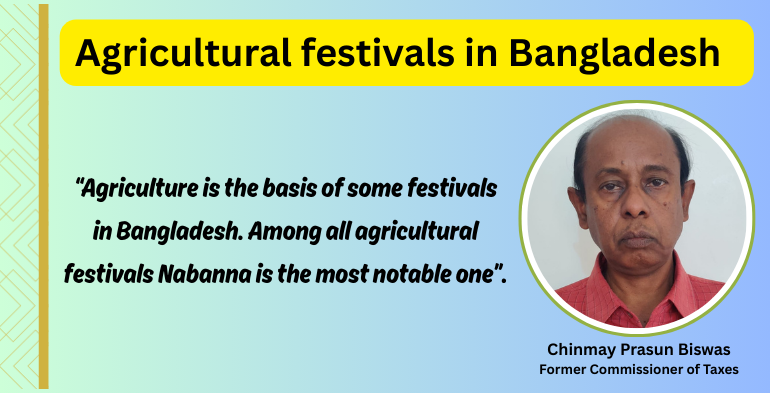
Chinmay Prasun Biswas: From time immemorial festival is an integral part of human life everywhere, every time and society. Literally and practically, festival means celebration of a joyful event - social, religious, cultural, local etc. Nature and extent of festivals may vary among place, time and community but the main aim is joy and celebration. Etymologically, the word festival has been derived from Latin word festivus meaning joyful or celebratory. Gradually festival has taken different shapes. Sometimes it is known as fair also.
Agriculture is the basis of some festivals in Bangladesh. Among all agricultural festivals Nabanna is the most notable one. It is totally a secular festival. Nabanna is a combination of two Bengali words – nabo (new) and anno (rice). As new rice is the main ingredient of this festival, it is known as Nabanna. It is celebrated to mark the first cooking of rice prepared from the new Aman paddy harvest. This festival is usually held in the Bengali month of Agrahayan during the hemanta (late autumn). Jeevanananda Das has written –
"আবার আসিব ফিরে ধানসিঁড়িটির তীরে - এই বাংলায়
হয়তো মানুষ নয় - হয়তো বা শঙ্খচিল শালিকের বেশে,
হয়তো ভোরের কাক হয়ে এই কার্তিকের নবান্নের দেশে"
Probably this festival was held in the month of Kartik at his birthplace Barisal. However, not time but the festival is important. In a song by Sumankalyanpur we hear –
"অঘ্রাণের সাত সকালে কৃষক বধূর ভাঙে ঘুম
---------------------আহা রে খুশী খুশী মন,
নবান্নেতে রইল বন্ধু তোমার নিমন্ত্রণ"।
The Nabanna festival has been being celebrated in Dhaka from 1998 at the initiative of The National Nabanna Festival Celebration Board every year on the first day of Agrahayan. Utsav Bangla has been organising a 3-day Nabanna festival under the banyan tree in Ramna Park for more than 12 years. Cultural organisation Showbiz Entertainment organises a 3-day Nabanna festival and Pitha Mela in Dhanmondi Rabindra Sarobar for last 12 years. Around 200 types of pithas are displayed in the festival. In addition, cultural performances including Nabanna dance and songs, folk songs, snake games, monkey games, stick games, merry-go-round, puppet show, street drama, etc. are held on open stage of the festival premises at every evening. On the closing day awards are given to the best pitha artists.
However, along the flow of time, this fully secular festival, mingled with the smell of soil, is now almost neglected even in rural areas. In many countries such a festival is observed officially but in Bangladesh the organisers have to face much trouble to secure permission to arrange this festival at the Fine Arts premises of Dhaka University and other places.
Another agricultural festival is Poush Parvan. The name itself clarifies that this festival is observed in the month of Poush. Traditionally, this festival is held on the last day of Poush. পিঠা and পায়েস are the main menus of this festival. We can remember two lines of the poem পল্লী স্মৃতি by Begum Sufia Kamal --
"পৌষ পার্বণে পিঠা খেতে বসে খুশীতে বিষম খেয়ে,
আরো উল্লাস বাড়িয়াছে মনে মায়ের বকুনি পেয়ে"।
This festival is now almost extinct. Some culture-lovers observe it in some places
However, along the flow of time, some other agricultural festivals have been added to the traditional ones. Such one is mango festival. Mango is an important agricultural product in Bangladesh. An average of 27 lakh metric tonnes of mango (7th in the world) are produced in Bangladesh every year. Mango festival is held in Dhaka under government initiative. Different government institutions including the Bangladesh Agricultural Research Institute (BARI) participate in arranging this festivals. Different varieties of mango are exhibited and sold here and it raises awareness among farmers about improved mango cultivation practice.
PRAN Group arranged 3-day Mango Festival on 10th July, 2025 at Rabindra Sarovar, Dhanmandi in the capital. Farmers from famous mango-farming areas, with their products, participated in the country's biggest (as claimed by the organisers) mango festival Pran Mango Fest. All types of mangoes produced in the country were exhibited in this open to all. festival. Origin, history, tradition and development of different types of mangoes were presented to younger generation. Through this fair mango farmers get opportunity to display and sell different types of mangoes.
Kamal Agro Farm arranges local mango fair in Dhaka every year. For this year the 3-month (from 31st May to 31st August) festival began in front of the Kalabagan Club ground at Dhanmandi. The fair remains open daily from 10 a.m. to 10 p.m. According to Kamal Agro Farm officials, mangoes are our brand ambassadors all over the world. They have been organising formalin-free mango fair in Dhaka from 2004. Though termed as fair, these are no less than festivals.
Away from the country, the First Bangladeshi Mango Festival (locally known as Al Hamba Exhibition), open to all, has been held at the eastern square of Souq Waqif in Qatar from 26th June, 2025 to 1st July, 2025. Organised jointly by the Private Engineering Office and the Bangladesh Embassy, various types of mangoes and fresh fruits from Bangladesh were exhibited there. It was also an opportunity to explore more market for Bangladeshi mango abroad. Bangladeshi mango festival was also held in the Netherlands in 2022.
Beyond these, month-long tree fair, jointly arranged by government and private nursery owners, is held every year from the metropolis to upazillas normally in June-July. Everywhere thousands of tree-lovers enthusiastically attend these fairs and procure thousands of plants of different types (wood, fruit, flower, herbal, medicinal, spice etc.). Horticulture, nursery, floriculture, gardening are important parts of agriculture. Tree-fair is also an agricultural festival having environmental and economic importance.
Fishery is another important sector of agriculture. National Fisheries Week is held every year normally in the last week of July (18th – 24th August this year). Programmes of this week include release of fish fry, discussion meeting, screening of documentary on progress in fisheries sector, water quality testing and advisory services for owners of ponds and water bodies, swimming competition for fish-farmers etc. Consumers get fresh fish here which is also an agricultural festival.
The writer is a former Commissioner of Taxes
























